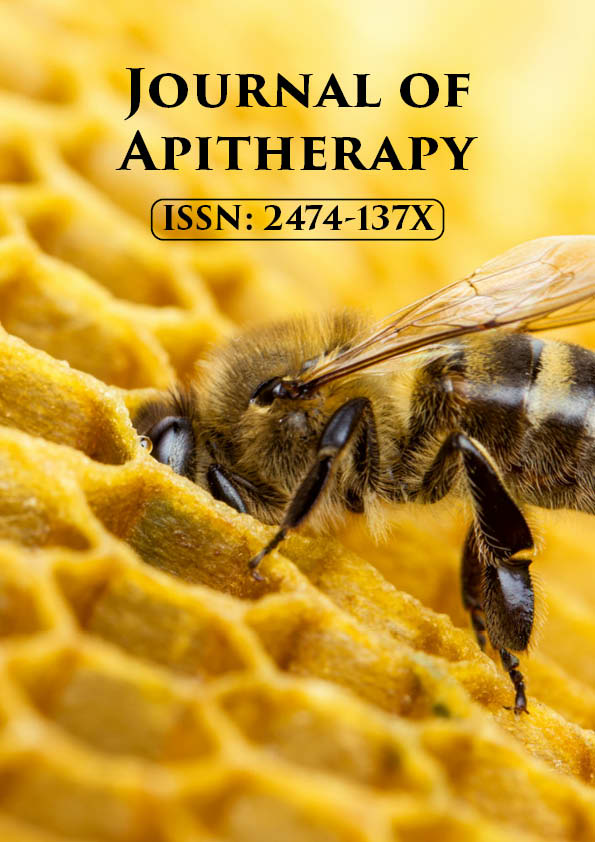Perspective - Journal of Apitherapy (2023)
Medicinal Properties and Scientific Studies of Honeydew Honey
Rafael Maia*Rafael Maia, Department of Forensic Medicine and Toxicology, Zagazig University, Egypt, Email: Rafael@gmail.com
Received: 09-Oct-2023, Manuscript No. JAPITHERAPY-23-123351; Editor assigned: 11-Oct-2023, Pre QC No. JAPITHERAPY-23-123351 (PQ); Reviewed: 25-Nov-2023, QC No. JAPITHERAPY-23-123351; Revised: 02-Nov-2023, Manuscript No. JAPITHERAPY-23-123351 (R); Published: 09-Nov-2023
Description
In the world of honey, there exists a distinct and lesser-known variety that goes beyond the typical golden sweetness associated with this natural wonder. Honeydew honey, often referred to as forest honey, is a unique and robust elixir that is not derived from flower nectar, but rather from the sweet excretions of sap-sucking insects, such as aphids and scale insects. This exceptional honey variety boasts a myriad of medicinal properties, turning it into a subject of fascination for researchers and health enthusiasts alike.
Origins and production
The production of honeydew honey is a testament to the intricate relationships within ecosystems. Rather than collecting nectar from flowers, bees that produce honeydew honey seek out the sugary secretions left behind by sap-feeding insects. These insects consume plant sap, extract nutrients, and excrete honeydew, a sugary substance that becomes the primary source for honeydew honey production.
Honeybees play a crucial role in the creation of honeydew honey. They collect the honeydew from the surfaces of leaves or twigs, and through a remarkable alchemical process within the hive, transform it into honey. The result is a dark, rich honey with a complex flavour profile, often characterized by notes of molasses, malt, and earthiness.
Medicinal properties of honeydew honey
Antioxidant powerhouse: Honeydew honey is renowned for its high antioxidant content. The presence of polyphenols, flavonoids, and other bioactive compounds gives it potent antioxidant properties. Antioxidants play a crucial role in neutralizing free radicals in the body, contributing to overall health and helping prevent chronic diseases.
Anti-inflammatory effects: Studies have shown that honeydew honey exhibits anti-inflammatory effects. This property makes it a potential natural remedy for conditions associated with inflammation, such as arthritis and inflammatory bowel diseases. Regular consumption of honeydew honey may contribute to mitigating inflammation in the body.
Wound healing: Honey, in general, has been used for centuries in wound care. Honeydew honey, with its unique composition, has demonstrated wound-healing properties. Its ability to promote tissue regeneration and prevent infection makes it a valuable topical treatment for cuts, burns, and other skin injuries.
Gastrointestinal health: The composition of honeydew honey includes oligosaccharides, which can have prebiotic effects, promoting the growth of beneficial gut bacteria. This can contribute to improved gastrointestinal health and may be beneficial for individuals with digestive issues.
Cough and respiratory health: Honey, including honeydew honey, has long been used as a natural remedy for coughs and respiratory issues. Its soothing properties can help alleviate throat irritation, and its antimicrobial effects may contribute to respiratory health.
Mineral content: Honeydew honey tends to have a higher mineral content compared to other honey varieties. It contains essential minerals such as potassium, calcium, magnesium, and iron, which are important for various physiological functions in the body.
Scientific studies and research findings
While honeydew honey has a rich history of traditional use in various cultures, modern scientific research has provided valuable insights into its medicinal properties. Studies have explored its chemical composition, antioxidant capacity, and potential therapeutic applications.
Research conducted on honeydew honey from different regions has revealed variations in its chemical profile, reflecting the diversity of plant sources and sap-feeding insects. The synergistic effects of compounds like phenolic acids, enzymes, and vitamins contribute to its multifaceted healing properties.
One notable area of interest is the antimicrobial activity of honeydew honey. It has demonstrated effectiveness against a range of bacteria, including antibiotic-resistant strains. This has implications for the development of natural alternatives to conventional antibiotics, addressing the growing concern of antibiotic resistance.
Moreover, investigations into honeydew honey's impact on chronic inflammatory conditions have shown promising results. The anti-inflammatory effects observed in both in vitro and animal studies suggest its potential application in managing inflammatory disorders in humans.
Challenges and considerations
While honeydew honey offers a plethora of benefits, there are considerations and challenges associated with its production and consumption:
Sourcing and authenticity: Authenticity is crucial when it comes to honey, and honeydew honey is no exception. Ensuring that honey labelled as honeydew honey is sourced from reliable and reputable sources is important to guarantee its quality and authenticity.
Environmental impact: The collection of honeydew by bees may have ecological implications, as it involves the interaction between bees, sap-feeding insects, and plants. Sustainable harvesting practices should be considered to minimize potential negative effects on ecosystems.
Individual sensitivities: While honeydew honey is generally well-tolerated, individuals with allergies to bee products should exercise caution. It's advisable to consult with a healthcare professional if there are concerns about allergic reactions.







